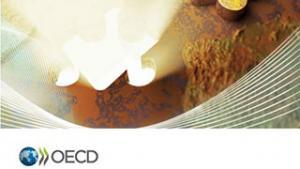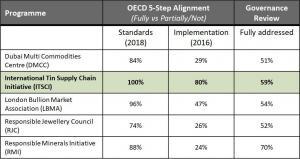 A detailed assessment by the OECD recently concluded that the standards of the ITSCI Programme are 100% aligned with the 5 Step due diligence recommendations of the OECD’s internationally accepted guidance for good company management, risk assessment and mitigation, auditing and public reporting in responsible minerals supply chains. This is a unique achievement among all initiatives assessed. Our implementation of the due diligence standards was also judged highly by a significant margin, with ITSCI achieving an alignment of 80%.
A detailed assessment by the OECD recently concluded that the standards of the ITSCI Programme are 100% aligned with the 5 Step due diligence recommendations of the OECD’s internationally accepted guidance for good company management, risk assessment and mitigation, auditing and public reporting in responsible minerals supply chains. This is a unique achievement among all initiatives assessed. Our implementation of the due diligence standards was also judged highly by a significant margin, with ITSCI achieving an alignment of 80%.
In a process that has lasted more than two years, the OECD, together with their consultant, developed, piloted and reported on an assessment methodology which will likely be adopted by the EU to assess industry schemes wishing to be recognised as part of their mineral due diligence regulation. Five mineral industry initiatives were included in this pilot assessment, three of which related specifically to audit at gold refiners, as well as the ITSCI Programme and the Responsible Minerals Initiative (RMI, previously CFSI) smelter audits. Gaps were identified by the OECD in the first assessment of five programme standards in 2016, and these have now been reassessed for 2018. Fortunately, ITSCI standards were already 98% aligned in 2016 requiring limited change, but we nevertheless remain committed to continually improving implementation and all other aspects of our activities.
Kay Nimmo, tin representative on the ITSCI Governance Committee commented on these positive results “We welcomed the opportunity to participate in the assessment and are delighted to have achieved recognition of the leading role that ITSCI plays in setting high due diligence standards in 3T mineral supply chains from central Africa. We believe that our high rankings are even more remarkable when considering the logistical and other practical challenges we face in implementation when supporting the mainly artisanal and small scale mineral sector.”
Ensuring appropriate standards of due diligence in supply chains remains the fundamental objective of the ITSCI Programme since that is what ensures market access for all. Continually monitoring that these standards are in place and implemented on-the-ground requires an extensive local network, something that is at the next level of difficulty after setting paper based audit standards, and only possible through a multi-stakeholder collaboration. Kay Nimmo also recognised that “This achievement has come from the hard work and commitment of the entire ITSCI team, from the International Tin Association (ITA) and the Tantalum-Niobium International Study Center (T.I.C.) to our ITSCI member companies, government partners and implementing teams such as Pact Inc and Synergy Global Consulting.”
The OECD Due Diligence Guidance for Responsible Supply Chains of Minerals from Conflict-Affected and High-Risk Areas provides detailed recommendations to help companies respect human rights and avoid contributing to conflict through their mineral purchasing decisions and practices. The International Tin Association has participated in OECD activities since the first guidance was in draft and remains on the OECD Multi-Stakeholder Group for this topic. The OECD Guidance has always been a primary reference point for ITSCI and our role is to transform its complexities and flexibilities into meaningful standards of due diligence supporting both large and small operators in many different countries.
The T.I.C.’s representative on the ITSCI Governance Committee, Roland Chavasse, explained that “the ITSCI Programme strives to ensure market access for all, including artisanal miners, and we have worked hard to set appropriate standards of due diligence to avoid disengagement which remains one of our fundamental objectives. We believe that the implementation of ITSCI has driven enormous improvements in human rights and will seek to minimize increased requirements from this assessment to avoid further increases to the burden on miners on the ground.”
The OECD also assessed various aspects of programme governance which are not part of the OECD guidance but are felt to be of importance. In this category the ITSCI programme achieved the second highest percentage of fully addressed items out of the five initiatives. ITSCI has a clear and formalised governance structure, and, a level of disclosure and transparency that goes beyond that expected by the OECD Guidance and that provided by other initiatives. Public information about the programme and its results are published on a recently updated ITSCI website, launched since the OECD assessment, and extensive supply chain information is immediately available to any downstream company who wishes to purchase access rights.
Some information from the full OECD report is presented in the following table but we recommend reference to the source document linked below, as the assessment and scoring methodology is complex.
OECD Report ‘Alignment Assessment of Industry Programmes with the OECD Minerals Guidance’ 2018
NGO Global Witness contributed to the development of the alignment assessment and while welcoming the results, also cautioned against their use without a full understanding of the methodology, and against a continued reliance on such audits.
Global Witness Press Release on OECD Alignment Report

